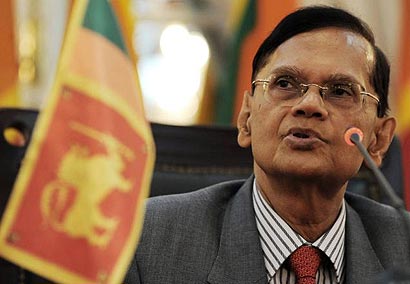Prof. Peiris explains why Sri Lanka won’t cooperate with UN probe

Sri Lanka will not cooperate with the proposed war crimes investigation undertaken by the Office of the United Nations High Commissioner for Human Rights, though the government remains committed to work with the United Nations as well as other international agencies, such as the International Committee of the Red Cross (ICRC).
External Affairs Minister Prof. G. L. Peiris emphasized that the government of Sri Lanka wouldn’t accept the jurisdiction of the UNHRC to undertake an inquiry, therefore the question of the government cooperating with the proposed mechanism didn’t arise. Prof. Peiris was responding to a query by The Island yesterday in the wake of UN Chief Ban Ki-moon urging Sri Lanka to extend its support to UNHRC.
A resolution moved by the US calling for an external investigation received 22 votes at the recently concluded UNHRC session. Being a member of the UNHRC, the US voted for its own resolution.
Minister Peiris said that the government decided against cooperating with the Office of the United Nations High Commissioner for Human Rights primarily due to three reasons.
The proposed investigation was beyond the scope of Ms Pillay’s office, the Minister said, adding that the second reason was her hostility towards Sri Lanka. The minister pointed out whatever those calling for UN intervention in Sri Lanka say; Ms Pillay would not approach the inquiry with an open mind. The UN rights chief’s claim that the Sri Lankan government was perpetrating atrocities against the Tamil people under the guise of fighting terrorism, which implied that there was no threat of terrorism in Sri Lanka and it was simply a creation of the Government. Not more than a week after the war ended in 2009, she called for an international inquiry against the Sri Lankan Government. “Under what basis did she call for such a move? These statements make it more than obvious that she is biased,” Prof Peiris said.
The government was also seriously concerned about the funding of the proposed investigative mechanism, the minister said. Sri Lanka could be at a great disadvantage due to the UNHRC being the recipient of large scale funding from several countries now calling for UN intervention, the minister said. Responding to another query, Prof. Peiris said that many member states of the UN were concerned about the way the UNHRC received its funding.
South Africa’s International Relations and Cooperation Minister Nkoana-Mashabane during the high level segment of the recently concluded UNHRC session expressed concern over politicization of the UN body. She said: “South Africa stands ready to work with all countries in the Council. For the Council to deliver on this vast mandate, it is important that the work of the Office of the High Commissioner for Human Rights is funded through assessed contributions, commensurate with the challenges we face is predictable. We must resist the bilateralisation of the mandate of the Council through earmarked donor funding to this office.”
Prof Peiris said that those pushing for external investigation here were silent on the progress made by a Presidential Commission investigating cases of alleged disappearances of persons in the Northern and Eastern Provinces.
Referring to an ongoing project titled Joint Needs Assessment; the minister said that the government was working closely with the UN to tackle problems faced by the displaced.
The minister said that since the conclusion of the war in May 2009, the government with the support of the international community had taken tangible measures to improve the living conditions of people living in war-torn areas. The ground situation was better though various interested parties continued to paint a bleak picture, the minister said.
(The Island)
Latest Headlines in Sri Lanka
- Sri Lanka allows women to work at night as sanitary and food service workers February 1, 2026
- India pledges INR 4 Billion aid to Sri Lanka in 2026-2027 Budget February 1, 2026
- Shiranthi Rajapaksa summoned to FCID on February 3, 2026 February 1, 2026
- Sri Lanka PM calls for education reform to strengthen nation February 1, 2026
- Sri Lanka revises fuel prices from February 1, 2026 January 31, 2026


